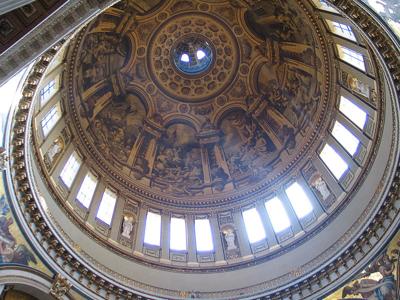It’s not often I find myself sitting in a chair underneath the dome of St Paul’s cathedral. As I waited for the talk to begin I peered up at the near-monochrome grisaille painting which extends the actual architecture into the pictorial space. Who it was by I had no idea, though thanks to Google I now know it was created by Sir James Thornhill, court painter and MP. That there were still people who combined such jobs, arriving at the Commons covered in paint, smelling of turps and ready to vote against the latest war. Maybe the commissioners felt a full-colour baroque painting would not have been fitting for London’s great Protestant cathedral, but the image is not as splendid as St Paul’s deserves.
 Canon Mark Oakley chaired the discussion amusingly (‘You talked about managing boredom, here’s a question about the General Synod‘), but the large audience was there to hear the views of ex-Archbishop Rowan Williams, who usually talks sense even if no one wants to listen. His partner on the panel was Michael Battle, a former student of his who has lived in South Africa with Desmond Tutu and is rector of a church in California.
Canon Mark Oakley chaired the discussion amusingly (‘You talked about managing boredom, here’s a question about the General Synod‘), but the large audience was there to hear the views of ex-Archbishop Rowan Williams, who usually talks sense even if no one wants to listen. His partner on the panel was Michael Battle, a former student of his who has lived in South Africa with Desmond Tutu and is rector of a church in California.
Battle spoke first, and focused on a the idea of Ubuntu. Geeks in the audience must have wondered how the world’s most popular free operating system was going to change the world, but Battle was referring to the South African philosophy of Ubuntu, popularised by Mandela and Tutu. Meaning humaness in Nguni Bantu it expresses the idea that a person is a person through other persons. Rather than Descartes’ dictum I think therefore I am, Ubuntu says I am because we are and because we are, I am. This was a generalised example of how life can be improved for people around the world and another way of expressing the Christian belief that we are all members of one body and we cannot function correctly without everyone else.
Rowan Williams looked at actual ways that the world could be changed, pondering how to build a common life with those with whom we think we have nothing in common. Similarly to Battle he wanted to challenge the mythology that we are disconnected from each other and the environment, and that finance is disconnected from any form of real life. He made several practical suggestions, including imposing a financial transaction tax and getting global co-ordination on fighting climate change. He also mentioned the vital importance of the education of women around the world as a means of change.
During the Q&A session Battle pointed out the way that a crisis can bring people together and Williams suggested building communities through spotting local needs and the ‘horribly obvious’ point of cultivating your friends. The message from both men was we can’t do this alone, we need to help each other. We need more emotional intelligence, looking at how we are feeling rather than just reacting. But ultimately we are all bound together by love.
More details about St Pauls’ Forums.

Leave a Reply